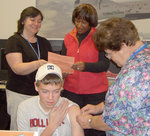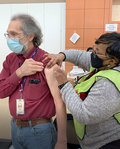






Retirement means her county paycheck has ended. But Roma Taylor says her public health work will go on forever.
Taylor retired in May after 41 years as the Scott County Health Department’s leader against communicable diseases.
Those who never had HIV, hepatitis B, H1N1, any STD, lead poisoning, or COVID-19 might consider themselves lucky they never had to meet Taylor.
Thousands who had those communicable diseases are grateful for her service, comfort, care and compassion. For many, Taylor was their only recourse when they had nowhere else to turn.
“People came to me when they had no one to talk to them, no one to touch them, no one to be with them,” Taylor recalled. “If I had panicked and not been willing to work with people who were positive, what would have happened?”
No need to speculate.
County health department director Amy Thoreson made it clear: Without Taylor, more Scott County residents would have suffered or died; from AIDS in the 1980s, swine flu in the 2000s, and COVID-19 last year.
“She is the calm and strength in the midst of chaos,” Thoreson said.
Thoreson witnessed decades of Taylor jumping into health threats most people would ignore, or avoid. She recalled H1N1 flu vaccination clinics in the late 2000s. “We’re wrangling kids into getting their shots. Roma is the one holding the kids. It’s the same thing in the clinic today. If there’s a commotion, Roma is the first to respond.”
Taylor’s last 22 years have been leading the health department’s clinic services, the county’s front line against infectious diseases.
Every year, Taylor’s relentless work helped curb syphilis, gonorrhea and other sexually transmissible diseases in the county, and across Iowa.
Each week, she initiated dozens of intimate conversations that most people choose to avoid, even within their own families.
Taylor initiated the county’s work with lead-poisoned kids in the 1980s. The environmental hazard causes gradual intellectual and functional disabilities. The risk remains, mostly in older, smaller homes with layers of lead-poisoned paint that pose no obvious threat to tenants.
In May, the health department documented six Scott County children with dangerous lead levels in their bloodstream.
“A family looks at a child and doesn’t see anything wrong. But the family doesn’t want to report it because they’re afraid they’ll be evicted. Their concern is where they’re going to live tomorrow. They’re not thinking about their child’s learning disabilities in five years,” Thoreson said.
Taylor said those tough talks are part of doing her duty for the family, and the community.
“I know sometimes people think we’re asking too many questions, or getting up in their business. But when someone has a communicable disease, our role is to stop the spread of that disease, and stop others from getting sick and suffering.”
Taylor credits her family for instilling the ethic that continues to drive her community service.
She was 12 when her dad succumbed to heart disease. She recalls being inspired by a succession of visiting nurses serving him after strokes related to hypertension and other conditions.
Her mom, Betty, remarried. Together, she and stepfather Theodore Wilson gave Roma a huge, extended Scott County family that also shaped her service.
Her mom was head of housekeeping at the former Marycrest College. Little Roma was a frequent campus visitor.
“She took care of all the students. I don’t remember a holiday when we didn’t have students over for dinner,” she said.
That made community indistinguishable from family.
“My family is everyone in the community. My own large extended family had people who were drug dealers and went to jail. We had kids in gangs. And we had doctors, lawyers and politicians. White, black, Hispanic. My family looks like the community I work in and take care of. If I’m helping my community, I’m helping my family.”
Taylor earned her bachelor of science in nursing from Marycrest in 1979 and almost immediately joined the county health department as an intern.
That exposed her to almost every aspect of public health, and inspired a passion for service and a commitment to the community.
“She showed tremendous passion for African-American women and getting them to understand their risks for breast cancer,” Thoreson said. Taylor is a breast cancer survivor and was honored as a chairman for the Race for the Cure.
And it inspired more outreach. “I do talks with community groups about how to do self breast exams,” Taylor said. “A lot of it became one-on-one with women who knew I’d had breast cancer. I went with them for follow-up mammograms.”
Those experiences made Taylor comfortable for countless television interviews for the health department. Those messages, delivered as comfortably to cameras as patients, drew thousands more to county health services, Thoreson said.
At the same time, Taylor inspired Iowa public health leaders across the state.
“She really was the voice of public health in Scott County,” said Pat Young, who ran Iowa Department of Public Health HIV and Hepatitis prevention statewide.
Young, now retired, cherishes her continuing friendship with Taylor. In fact, Young said Taylor’s first name spells out Roma’s distinctions.
“R is for resilient. O is for open and flexible. She just gets things done. M is for magnetic. People are drawn to her. And A is for amicable. She is so friendly, and projects good will. But she is direct and to the point,” Young said.
Colleen Bornmueller is the program coordinator of the Family Planning Council of Iowa, and said Taylor inspired health professionals statewide. For years, Bornmueller managed Iowa’s STD testing program for the state health department.
When Bornmueller was ramping up statewide programs, she turned to Taylor.
“I was struggling to learn how to apply best practices and quality assurance. I went to visit Roma. She pulled down all these three-ring binders, had every policy and procedure written out in detail. So everyone had that info at their finger tips.
“Her attention to details. And being able to communicate policies to other clinics and staff. She runs a tight ship.
“I don’t know what her secret was. It’s unusual to have that caring persona, but at the same time, be a stickler for the minute attention to details. That’s why she’ll be missed so much,” Bornmueller said.
Both said Taylor’s faith shined in every interaction, and strengthened her service locally and statewide.
“She provided a lot of partnerships with faith-based communities in Scott County and Davenport. Roma has a very strong faith, and she knew how to bring that community. She is very family-centered,” Young said.
“And she loves her shoes. She’s a power shopper,” Young added.
“Whenever we came to Davenport for a meeting, you could bet Roma would take Pat to hit the stores,” Bornmueller said. “Retail therapy. I never saw Roma not looking immaculate.”
That showed respect for clients, and for Iowa public health leaders influenced by Taylor’s training over the years. “She was a mentor to so many. There are literally hundreds of public health professionals across Iowa directly influenced by Roma,” Young said.
Taylor regards her state-level work as an extension of her family/community.
“I really embraced it. With HIV, I was seeing more funding come into the state. I felt it was important that people on the east side of the state had a say in where the money was going,” Taylor said. “We made sure we didn’t forget about African-American, Hispanic, Vietnamese and other Iowans.”
Taylor said the work has changed over her four decades. And so have the clients.
“Over the last 10 years, people are becoming more resistant to public health, to this notion of taking care of each other. I don’t know if we’re not providing enough education. I’m not sure why people are so hesitant to share.”
Among her final duties was counseling those calling with questions about the COVID vaccine.
“They call all scared about rumors they’ve heard. I say, ‘Let’s not think about why it’s important you don’t get vaccinated. Let’s talk about why it is important that you’d take it. Who is the family member you want to be around? Who do you want to visit?’ I try to get people to think about more than ‘me, me, me, me, me.’
And she talks about losing her brother-in-law to COVID.
Expect to see Taylor remain active in public health as a volunteer. “I retired from the county, not from my work.”
She also has travel plans with husband, James, who retired from Nestlé Purina in Davenport. That includes Wisconsin trips to see her oldest son, Rico, his wife Leighah, their daughter Rain, in graduate school, and teenage son, Rylan.
Another son, Reed and wife, Dana, live in Davenport with their children, Roddick, 8, Rosalie, 5 and 7-month-old Richmond.
Taylor had planned to retire after 40 years, but twice delayed scheduled retirement to work through the pandemic. She spent her last week assisting with inventory to close the NorthPark Mall testing center she helped open.
In the last months, she visited vaccination sites, and gave a few hundred shots. That included vaccinating her longtime colleague, county medical director Dr. Louis Katz.
“There will never be another Roma,” Katz said. “You can list all her duties and recite her accomplishments and never understand the power this woman wields. She’s a force of nature.”